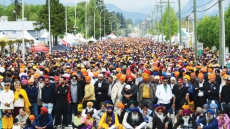The will of the Divine mandates a colourful diverse society. Let ours be one of those.
Vaisakhi is back, and we join again to move forward the conversation we started the previous year.
Earlier we debated the significance of the occasion acrosscultures, and how the Guru brought about a transformation of this cultural confluence from folk to Divine.
The basis of this culture is a Divine imbued society that guarantees a dignified, free and just life. It is based on the premise of an essential unity of all existence; its yearning for a perpetual connection and harmony.
As we celebrate Vaisakhi year after year, we are confronted with an ugly reality that is in stark contrast to these ideals. Despite its progressive outlook, the current world order is clearly in a regressive shift. But,this is not a recent phenomenon as some would make
us believe. The move has been slow and steady, but sure; it is just more evident now. World over, institutions are exhibiting illiberal ethos, driven by xenophobia, racism, sexism, religious hatred, and supremacist tendencies.

In a fast shrinking world, societies and cultures are interacting more in the wake of mass migrations, either in search of greener pastures or to escape persecution.
As a result, there is disruptive change in the demographics of local populations that feel threatened on multiple counts. A backlash is evident. Conservative and protectionist governments have been elected around the globe in response to this, more so in supposedly liberal democracies.
The facade of civilization erected on the premise of education, evolution of thought and modernity is crumbling. The hatred is visible across classes in the public sphere everywhere. Democratic processes have only facilitated majoritarian rule with sectarian overtones, supported by the super structure of nation state that, ironically, only benefits a few elites riding on the insecurities of a majority, giving an illusion of power and control to others. But it severely affects the more vulnerable weaker sections and minorities.

Though Sikhs and Punjabis are primarily on the receiving end of this in the foreign lands, due to their visible religious symbols and South Asian identity, this phenomenon is also playing out in Punjab in a milder form; more in perception and attitude towards migrants from outside Punjab that come in search of livelihood. There is no doubt that Punjabi disdain pales out in front of the physical backlash faced by them in North America, particularly the US.
This tells us that the issue is global, though uneven. But something major is amiss in the human “advancement,” that does not necessarily elevate the whole of a being to a noble stature. A civilized culture is only a byproduct of an individual’s intrinsic nature and conduct.
From a Sikh perspective, as long as the individual does not identify and connect with the divine, his/her conduct remains ordinary and corrupt.
There are so many bondages of the being; the Guru-oriented overcome them and find the gate to freedom. Truth is higher than everything; but higher still is truthful conduct.

With these ideals, the question is, how are we faring in our engagement with ourselves and others? If we aspire to develop a warmer relationship with our immediate society, we need to look beyond serving state departments, circles of professional work, and token interfaith forums. Not just a few symbolic faces, we need to stand collectively in solidarity with ethnic, religious and sexual minorities.
As we seek equal status and opportunity for ourselves, our position will primarily be decided by the level of our own activism and outreach.
Let’s actively shift the debate from “tolerance” to a coexistence that celebrates differences and compliments each other’s experiences to enrich our collective lives.

The will of the Divine mandates a colourful diverse society. Cultures that are liberal, magnanimous and all-embracing will survive. Let ours be one of those! Great wisdom of the Divine is my true Guru, who has given me the sight to look upon friend and foe alike.
About the author
Surender Pal Singh is a student of Sikh theology. He works at the Sikh Research Institute, where he instructs courses on Gurbani linguistics and Sikh theology, besides conducting research for curriculums, presentations, and research papers on Sikh culture. He holds a Masters degree in English and Religious Studies. He lives in the outskirts of Chandigarh, Punjab, with his family.




